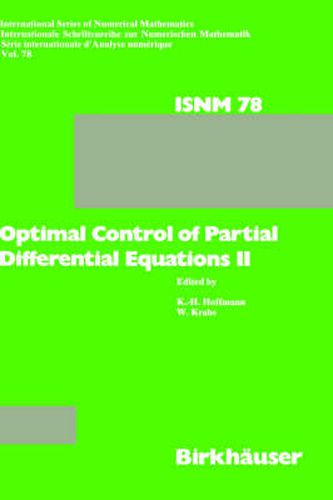Readings Newsletter
Become a Readings Member to make your shopping experience even easier.
Sign in or sign up for free!
You’re not far away from qualifying for FREE standard shipping within Australia
You’ve qualified for FREE standard shipping within Australia
The cart is loading…






This title is printed to order. This book may have been self-published. If so, we cannot guarantee the quality of the content. In the main most books will have gone through the editing process however some may not. We therefore suggest that you be aware of this before ordering this book. If in doubt check either the author or publisher’s details as we are unable to accept any returns unless they are faulty. Please contact us if you have any questions.
This volume contains the contributions of participants of the conference Optimal Control of Partial Differential Equations which, under the chairmanship of the editors, took place at the Mathematisches Forschungsinstitut Oberwolfach from May 18 to May 24, 1986. The great variety of topics covered by the contributions strongly indicates that also in the future it will be impossible to develop a unifying control theory of partial differential equations. On the other hand, there is a strong tendency to treat prob lems which are directly connected to practical applications. So this volume contains real-world applications like optimal cooling laws for the production of rolled steel or concrete solutions for the problem of optimal shape design in mechanics and hydrody namics. Another main topic is the construction of numerical methods. This includes applications of the finite element method as well as of Quasi-Newton-methods to con strained and unconstrained control problems. Also, very complex problems arising in the theory of free boundary value problems are treated. ]~inally, some contribu tions show how practical problems stimulate the further development of the theory; in particular, this is the case for fields like suboptimal control, necessary optimality conditions and sensitivity analysis. As usual, the lectures and stimulating discussions took place in the pleasant at mosphere of the Mathematisches Forschungsinstitut Oberwolfach. Special thanks of the participants are returned to the Director as well as to the staff of the institute.
$9.00 standard shipping within Australia
FREE standard shipping within Australia for orders over $100.00
Express & International shipping calculated at checkout
This title is printed to order. This book may have been self-published. If so, we cannot guarantee the quality of the content. In the main most books will have gone through the editing process however some may not. We therefore suggest that you be aware of this before ordering this book. If in doubt check either the author or publisher’s details as we are unable to accept any returns unless they are faulty. Please contact us if you have any questions.
This volume contains the contributions of participants of the conference Optimal Control of Partial Differential Equations which, under the chairmanship of the editors, took place at the Mathematisches Forschungsinstitut Oberwolfach from May 18 to May 24, 1986. The great variety of topics covered by the contributions strongly indicates that also in the future it will be impossible to develop a unifying control theory of partial differential equations. On the other hand, there is a strong tendency to treat prob lems which are directly connected to practical applications. So this volume contains real-world applications like optimal cooling laws for the production of rolled steel or concrete solutions for the problem of optimal shape design in mechanics and hydrody namics. Another main topic is the construction of numerical methods. This includes applications of the finite element method as well as of Quasi-Newton-methods to con strained and unconstrained control problems. Also, very complex problems arising in the theory of free boundary value problems are treated. ]~inally, some contribu tions show how practical problems stimulate the further development of the theory; in particular, this is the case for fields like suboptimal control, necessary optimality conditions and sensitivity analysis. As usual, the lectures and stimulating discussions took place in the pleasant at mosphere of the Mathematisches Forschungsinstitut Oberwolfach. Special thanks of the participants are returned to the Director as well as to the staff of the institute.